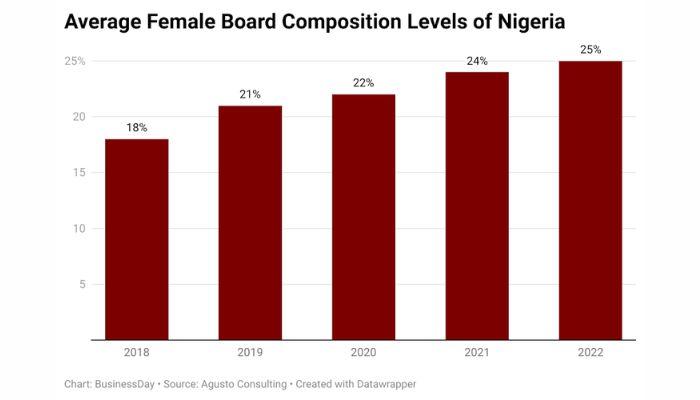More women secured seats at the boardroom tables of Nigeria’s most valuable companies last year, showing progress towards gender diversity at the workplace, a new report shows.
The share of women on boards surged to an all-time high in 2022, according to the report by Agusto Consulting, a subsidiary of Agusto & Co, a pan-African credit rating agency.
In the report titled ‘Gender Diversity in Corporate Leadership (the Board of Directors)’, Agusto analysed the boards of the 25 most valuable companies in Nigeria, based on their market capitalisation as at the end of 2022.
The report shows that the share of female board members has risen steadily in the past five years, hitting 25 percent last year from 18 percent in 2018. That compares with 36 percent in South Africa, 41 percent in the United Kingdom and 35 percent in the United States.
“Despite the relative progress in Nigeria, the review, especially with South Africa, a country on the African continent, reveals that there is still material room for improvement in Nigeria,” Agusto Consulting said.
It said this is further buttressed by the fact that Nigeria’s 25 percent threshold was largely achieved on the back of the push from companies that can be defined as being progressive on the diversity agenda.
“We note that the strong female representation on the boards of UBA, Lafarge and Guinness may have masked Nigeria’s underwhelming levels of female representation amongst the select companies,” it added.
The report also revealed that the United Bank for Africa Plc (UBA) has the highest female board composition level at 50 percent. “Thus, UBA has an equal number of men and women on its board of directors.”
The other firms that round out the top five are Lafarge Africa Plc (45 percent), Guinness Nigeria Plc (45 percent), Stanbic IBTC Holdings Plc (42 percent) and Nigerian Breweries Plc (42 percent).
FBN Holdings Plc (nine percent), BUA Cement Plc (13 percent), Geregu Power Plc (11 percent), Union Bank of Nigeria Plc (14 percent) and Okomu Oil Comlany Plc (15 percent) recorded the lowest proportions of female board members.
The Agusto Consulting report highlighted that 10 companies added more women on their board between 2020 and 2022, thus signifying greater representation. “Okomu Oil made an impressive move on its board from having no female representation in 2020 to 15 percent representation by the end of 2022.”
“Flour Mills and Zenith Bank also recorded significant improvement between 2020 and 2022, moving from seven percent and eight percent respectively in 2020 to 20 percent apiece by 2022,” it said.
The 2018 Nigerian Code of Corporate Governance (NCCG), which emphasises gender diversity in corporate leadership, took effect from January 2020. It states that a company’s board of directors should take actions to promote gender, age and cultural diversity in its board membership and have policies to govern these processes.
According to Agusto Consulting, the NCCG makes no clear provision for the exact portion of female representation on the board.
“We note that the Code adopts a principle based approach of voluntary compliance,” the firm said. “The realities indicate that the intentions of the NCCG have been undermined with the level of under-representation of women on the board. In some instances, albeit amongst the negative outliers, there have been companies in Nigeria with only one and in some instances, no women represented on their board.”
Last year, the World Economic Forum (WEF) said the country improved in its global gender gap index where it ranked 123rd out of 146 countries, up from 139th in the previous index. Its economic participation and opportunity sub-index grew from 78th position to 50th position.
“In covering 63.9 percent of its gender gap, Nigeria (123rd) returns to higher and earlier levels of parity (2013, 2016) registered in the 16-year period covered by the report,” WEF said.
It said the country also ascends 16 ranks on the overall index, with positive changes recorded on the economic and educational sub-indexes. “After dipping in 2021, overall workforce parity recovered in Nigeria, although the rates of participation decreased for both men and women.”
To boost female board representation, analysts at Agusto Consulting recommended that the NCCG and other regulatory bodies, as well as Nigerian companies should make a stronger push to increase the representation of women on their boards.
“This will place Nigeria in good stead on global best practice benchmarks. Overall, we note that there may be a need to introduce female diversity benchmarks as moral suasion is proving to be insufficient to boost diversity on the boards of Corporate Nigeria,” they said.
They said these rules have worked in the UK, adding: “We believe these are learning points for Nigeria.”
Here are top five companies and their female board members
UBA
Eight of its 15 board members are women.
-Owanari Duke is a former first lady of Cross River state. She is also the managing partner at Duke and Bobmanuel, a law firm based in Lagos.
-Aisha Baba is the founding and managing partner at Ebo Hassan Baba & Co, Abuja.
-Caroline Anyanwu is the founder/principal consultant at Fineline Business Advisory Limited.
-Erelu Adebayo is the founder of Erelu Adebayo Foundation and Erelu Adebayo Children’s Home.
-Angela Aneke is the CEO of Angela Aneke & Co
-Abiola Bawuah is the first-ever female CEO of UBA Africa.
-Sola Yomi-Ajayi is the CEO of UBA America.
-Emem Usoro, UBA’s executive director, Nigerian North Bank.
Lafarge Africa
Half of its 12 board members are women.
-Adewale Oyinkan is a retired executive director and chief financial officer of Union Bank
-Elenda Giwa-Amu is the CEO of Chandrea Lifestyle Limited.
-Adenike Ogunlesi is the founder and creative director at Ruff ‘n’ Tumble.
-Karine Mercie is the group head of tax at LafargeHolcim.
-Sonal Shrivastava is the chief financial officer at Vedanta Resources Limited.
-Adewunmi Alode is Lafarge Africa’s general counsel and company secretary.
Guinness Nigeria
12 members, 5 are women
-Omobola Johnson is the first female to hold the position of board chair of Guinness Nigeria.
-Ngozi Edozien is the founder and managing director at Invivo Partners Limited and Physio Centers of Africa Limited.
-Gráinne Wafer is currently Diageo’s global director for Beer, Baileys and Smirnoff.
-Yemisi Ayeni is the chairperson of NASCON Allied Industries Plc.
-Tariye Gbadegesin is the CEO of ARM-Harith Infrastructure Investment Limited.
Read also: Only 35% of Nigerian women own bank accounts – NBS
Stanbic IBTC Holdings
Five of its 14 board members are women.
-Sola David-Borha recently retired as chief executive of Standard Bank, Africa Regions.
-Bunmi Dayo-Olagunju is the executive director of operations for Stanbic IBTC Bank.
-Miannaya Essien is a senior advocate of Nigeria and the managing partner of Principles Law Partnership.
-Rabi Isma was previously director of HR Business Partnering & Health and Safety at Emerging Markets Telecommunications Services Limited (operators of 9Mobile).
-Funeka Montjane is the chief cxecutive, Consumer and High Net Worth Clients for Standard Bank Group.
Nigerian Breweries
12 members, five are women.
-Adeyinka Aroyewun is the managing consultant at Atticus Allen Consulting.
-Ndidi Nwuneli is the managing partner at Sahel Consulting Agriculture & Nutrition Limited.
-Ifueko Omoigui-Okauru is the managing partner at Compliance Professionals Plc.
-Yeliz Yedikardesler is the regional chief financial officer at Heineken Africa, Middle East & Eastern Europe.
-Juliet Anammah is the chairwoman, Jumia Nigeria and head of Institutional Affairs across Africa.






